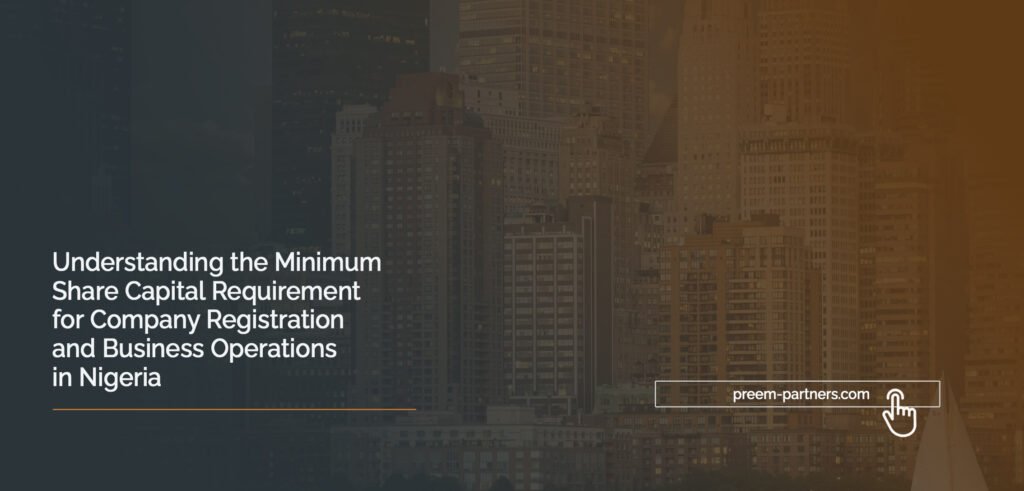
Preem & Partners | 16th February, 2024
In Nigeria, the process of starting a business involves navigating various legal and financial requirements, one of which is understanding the minimum share capital required for company registration and subsequent business operations.
Share capital refers to the amount of money invested in the company by its owners or shareholders in exchange for ownership interests or shares in the business. Share capital forms the financial backbone of a company, dictating its capacity to operate, expand, and fulfill its obligations.
Aspiring entrepreneurs and existing businesses alike must understand the intricacies of share capital requirements to ensure compliance with regulatory standards and facilitate smooth business operations. This article sheds light on the significance of minimum share capital in the Nigerian business landscape, providing clarity and guidance for individuals and companies venturing into entrepreneurship or expanding their business horizons. It further outlines share capital threshold applicable to certain companies in particular industries.
Minimum share capital requirements are designed to ensure financial stability, credibility, and investor protection within the business environment. By mandating a minimum level of capitalisation, regulatory authorities aim to mitigate risks associated with undercapitalised businesses, promote fair competition, and safeguard the interests of investors.
Meeting minimum share capital requirements can be a crucial prerequisite for obtaining licenses within specific industries. Failure to satisfy the mandated shareholding threshold may result in the Corporate Affairs Commission [“the Commission”] denying registration approval for the company. Moreover, if registration is granted even where the company does not satisfy the mandated shareholding threshold, the company may face rejection or refusal of the required license by the issuing body. And stakeholders which allow a company which carries on business without obtaining the necessary license exposes the company and its directors to civil and criminal liability, and its investors to financial risk.
It must be noted, however, that when a company is required to possess a specific minimum share capital, it does not signify that the company or its promoters are obliged to remit this amount to the government or the Commission during incorporation or expansion. Rather, it serves as an indication of the extent of the promoters’ risk and liability to the company. This requirement primarily facilitates the Commission and the Federal Inland Revenue Service [FIRS] in determining the applicable amount that the promoters are obligated to contribute towards registration of the stated share capital.
Generally, private companies in Nigeria have a minimum issued share capital requirement of N100,000, while public companies require a share capital minimum of N2,000,000. However, specific industries, determined by the company’s object or name, may mandate a higher minimum share capital for registration with the Commission, more often as a condition for licensing. Below are examples of companies subject to strict regulation regarding their minimum share capital requirements, along with their respective minimum share capital requirements.
Agents of Foreign Airlines – N1 Million
Agricultural Seeds, Productions, Processing, Marketing – N10 Million
Air Ambulance/Fumigation/Private Jet – N20 Million
Air Transport (International) – N2 Billion
Air Transport (Local) – N500 Million
Air Transport (Regional) – N1 Billion
Asset Management (Intangible Assets) – N300 Million
Aviation (Air Transport Training Institutions) – N2 Million
Aviation (Ground Handling Services) – N500 Million
Broker/Dealer – N300 Million
Bureau De Change – N35 Million
Cabotage Trade – N25 Million
Capital Trade Point – N20 Million
Closed Pension Fund – N500 Million
Commercial Bank with International Authorisation – N50 Billion
Commercial Bank with National Authorisation – N25 Billion
Commercial Bank with Regional Authorisation – N10 Billion
Commodities Broker – N40 Million
Company with Foreign Participation – N100 Million
Composite Insurance – N18 Billion
Consultant (Corporate) – N5 Million
Consultant (Individual) – N500 Thousand
Consultant (Partnership) – N2 Million
Corporate Investment Adviser – N5 Million
Corporate Investment Adviser (Registrar) – N150 Million
Corporate/Sub Broker – N5 Million
Finance Company – N20 Million
Freigth Forwarding – N5 Million
Fund/Portfolio Manager – N150 Million
General Insurance – N10 Billion
General Micro-insurance – N200 Million
Health Maintenance Organisation – HMO – (National) – N400 Million
Health Maintenance Organisation – HMO – (Regional) – N200 Million
Health Maintenance Organisation – HMO – (State) – N100 Million.
Individual Investment Adviser – N2 Million
Insurance Broker – N5 Million
Issuing House – N200 Million
Life Insurance – N8 Billion
Life Micro-insurance – N150 Million
Lottery – N5 Million
Market Maker – N2 Billion
Merchant Bank – N15 Billion
Micro Finance Bank (National) – N5 Billion
Micro Finance Bank (State & FCT) – N1 Billion
Mobile Money Operation (E Money Issuing, Wallet Creation and Management, Pool Account Management Activities as Permissible under Super Agents) – N2 Billion.
National Microinsurer – N600 Million
Non-Interest Bank (National) – N10 Billion
Non-Interest Bank (Regional) – N5 Billion
Payment Service Bank – N5 Billion
Payment Solutions Service Provider – PSSP (payment processing gateway and portal, payment solution/application development, merchant service aggregation and collection) – N100 Million.
Payment Solutions Services – PSS (as permissible under super agents PTS and PSSP (combined) – N250 Million.
Payment Terminal Service Provider – PTSP – (POS Terminal Deployment and Services, POS Terminal Ownership, PTAD, Merchant/Agent Training and Support) – N100 Million.
Pension Fund Administrator – N1 Billion
Pension Fund/asset Custodian – N2 Billion
Primary Mortgage Institution – N2 Billion
Private Security Company/Consultant – N10 Million
Rating Agency – N150 Million
Re-insurance – N20 Billion
Shipping Company/Agent – N25 Million
Sports Lottery – N30 Million
State Microinsurer – N100 Million
Stock Broker – N200 Million
Stock Dealer – N100 Million
Super Agent (Agent Recruitment and Management) – N50 Million
Takaful Insurance (General and Family Takaful) – N200 Million
Travel/Tours – N30 Million
Trustee – N300 Million
Underwriter – N200 Million
Unit Micro Finance Bank (Tier 1) – N200 Million
Unit Micro Finance Bank (Tier 2) – N50 Million
Unit Microinsurer – N40 Million
Venture Capital Manager – N20 Million
Understanding and complying with the minimum share capital requirements for company registration and business operations in Nigeria is paramount for shareholders and directors. By adhering to these standards, companies can establish a solid financial foundation, enhance credibility, avoid the extra monetary stress involved in application rejection and the delay associated with it, which may influence investor confidence.
Seeking legal advice is paramount when undertaking processes such as incorporating a company, increasing share capital, or obtaining corporate licenses. Rather than simply issuing instructions to corporate law agents, prioritising consultation with legal experts ensures compliance with relevant regulations and mitigates potential legal and financial risks. Recognising the value of legal advice underscores a proactive approach to compliance and risk management in business operations.
